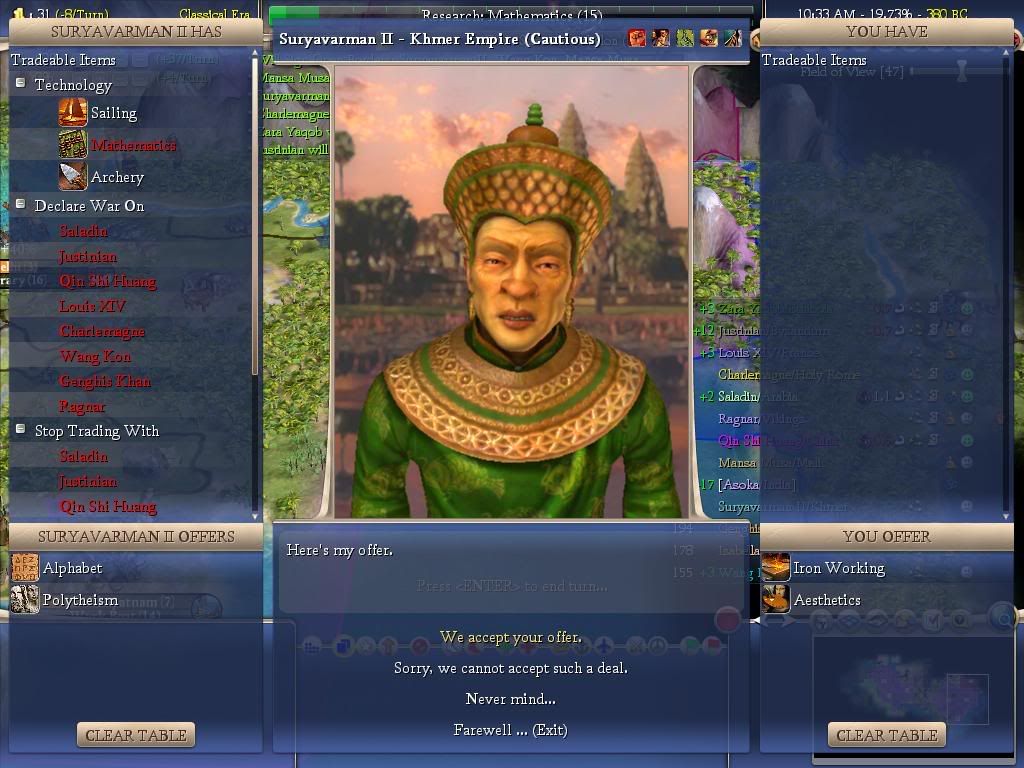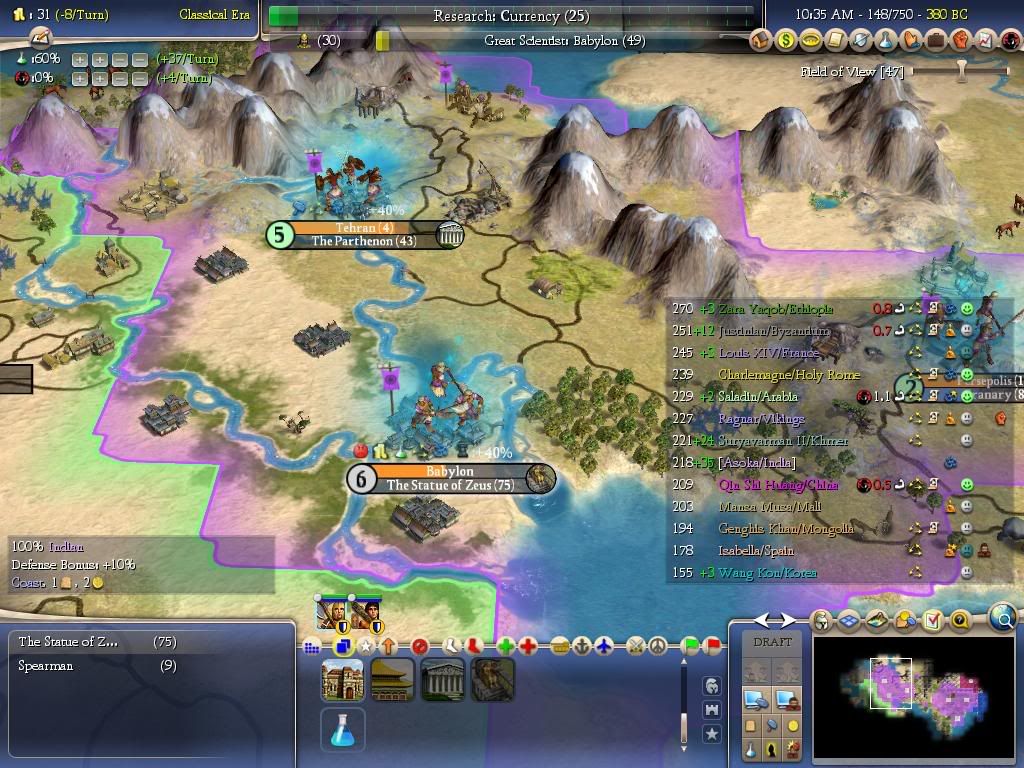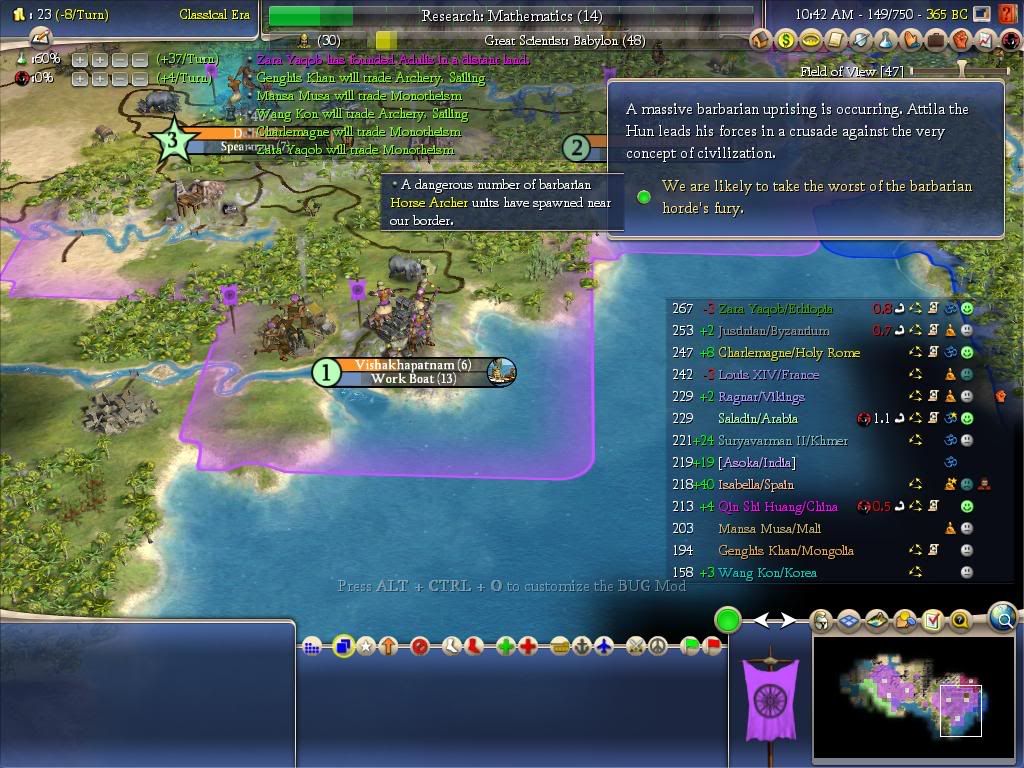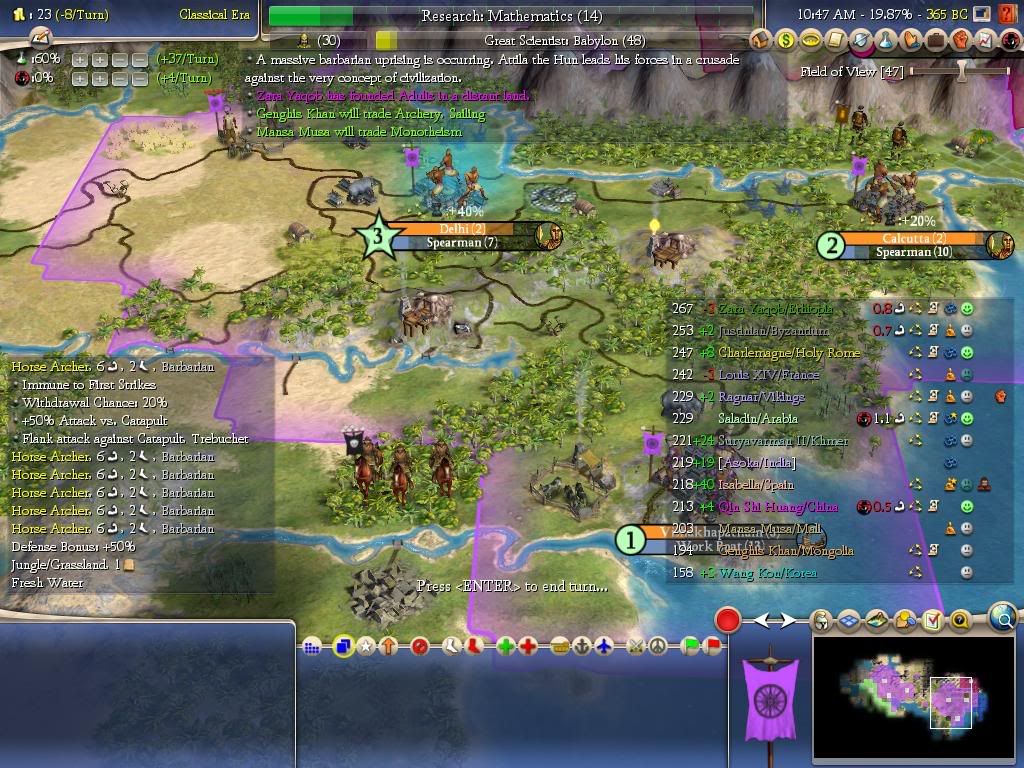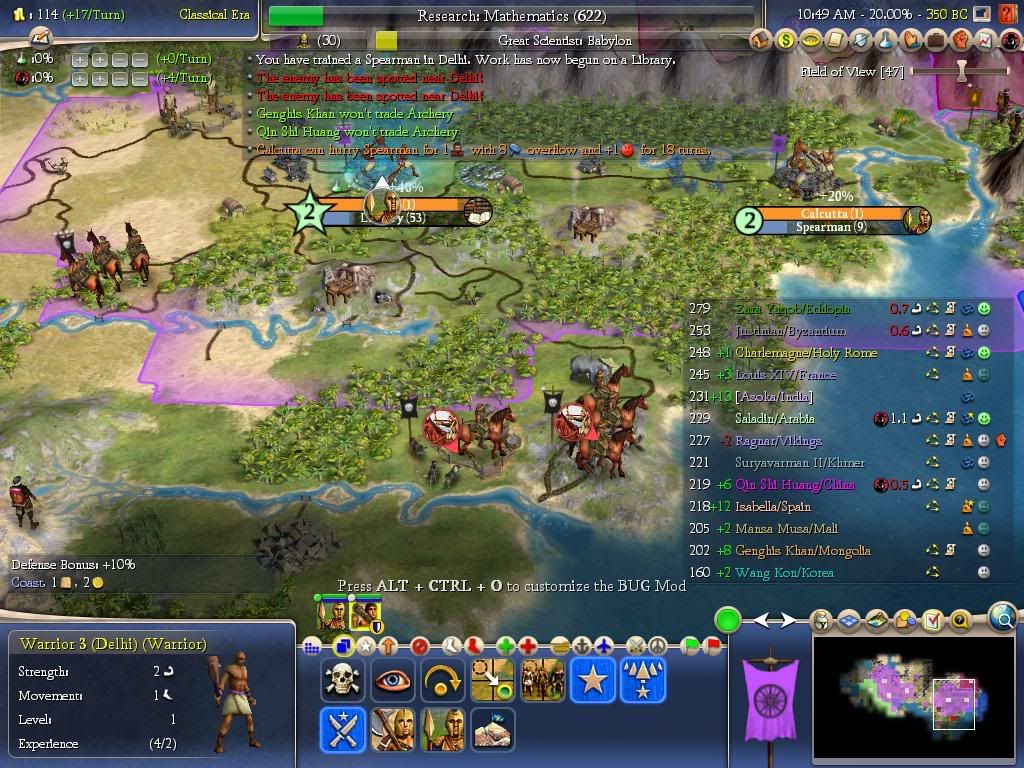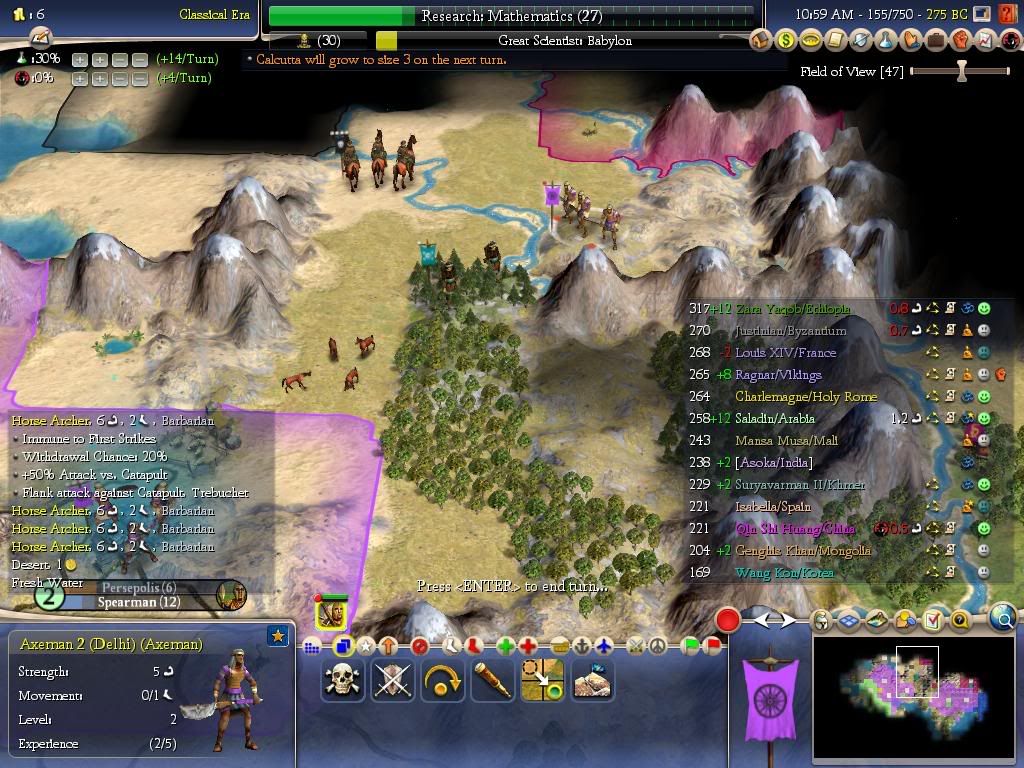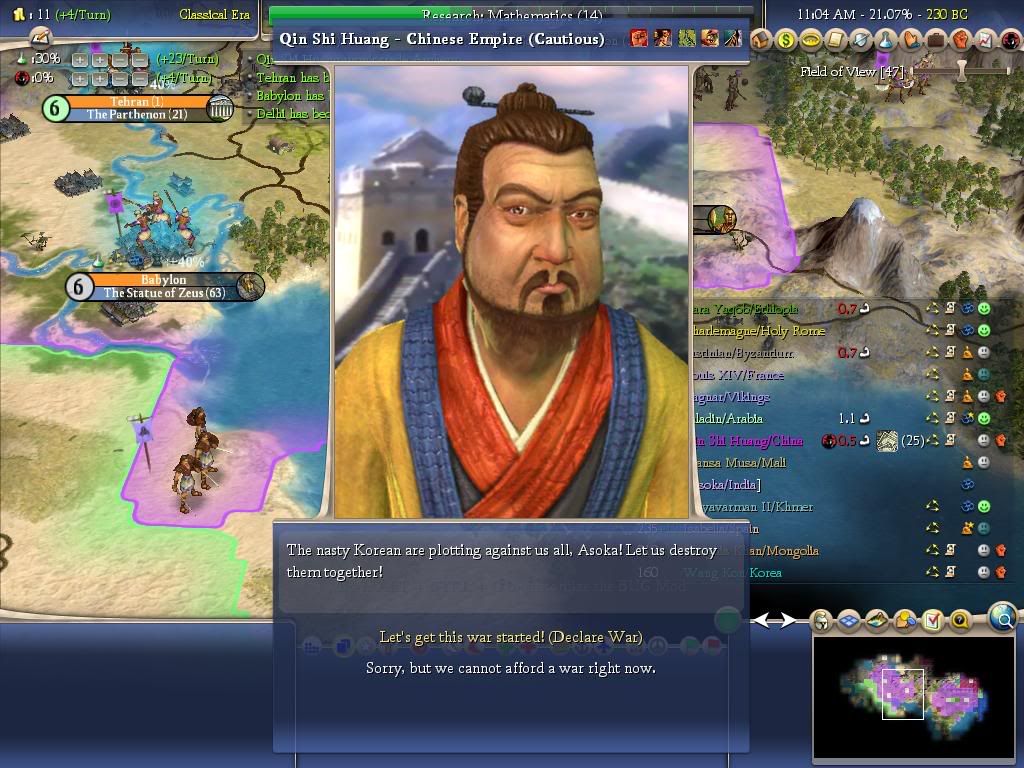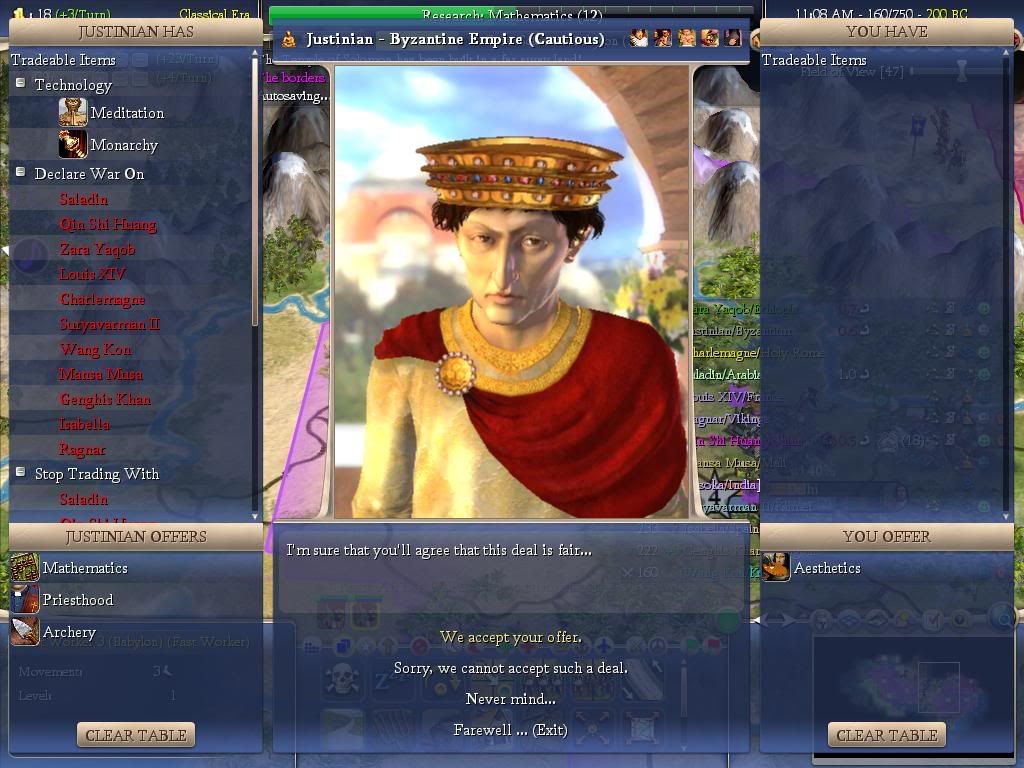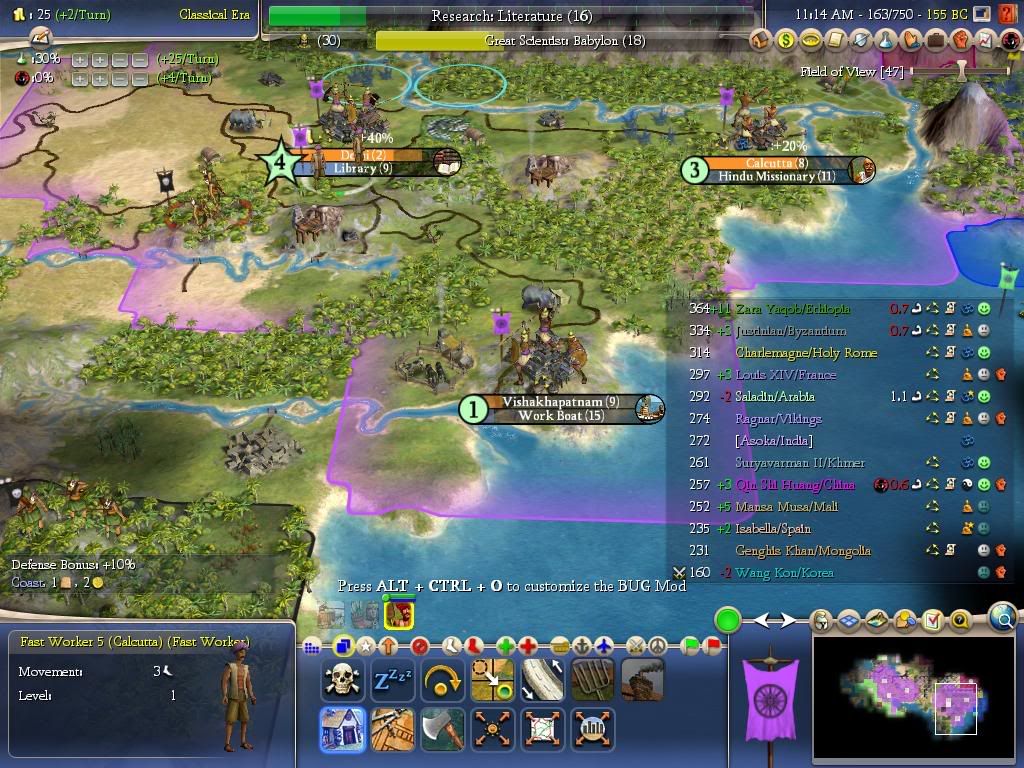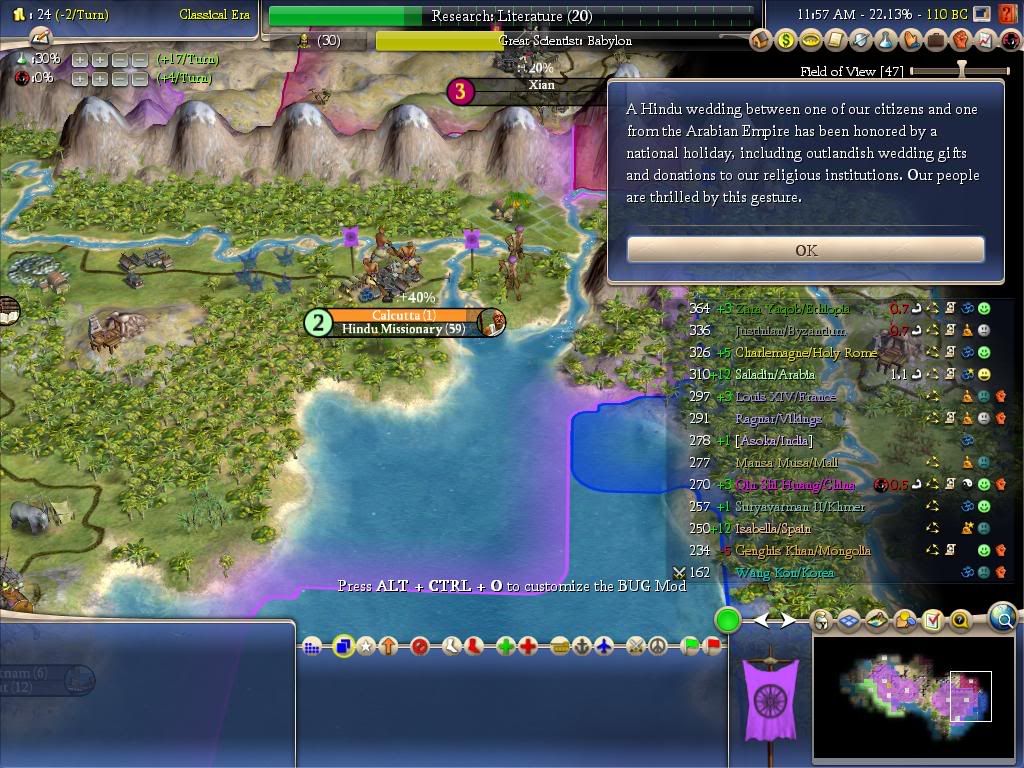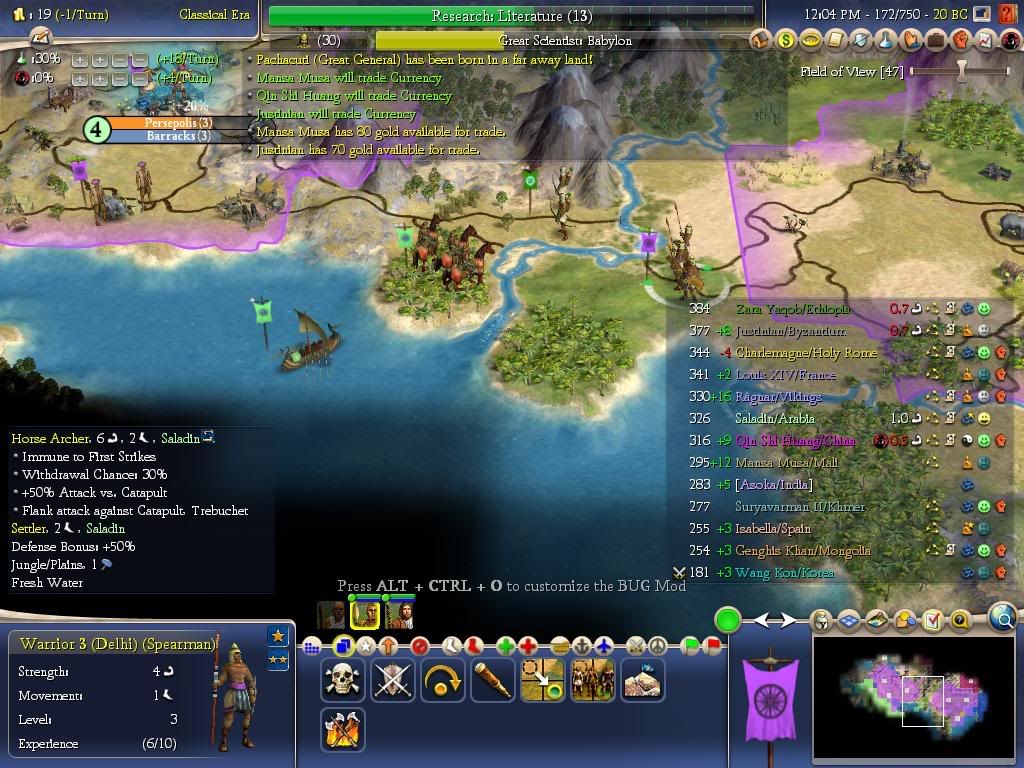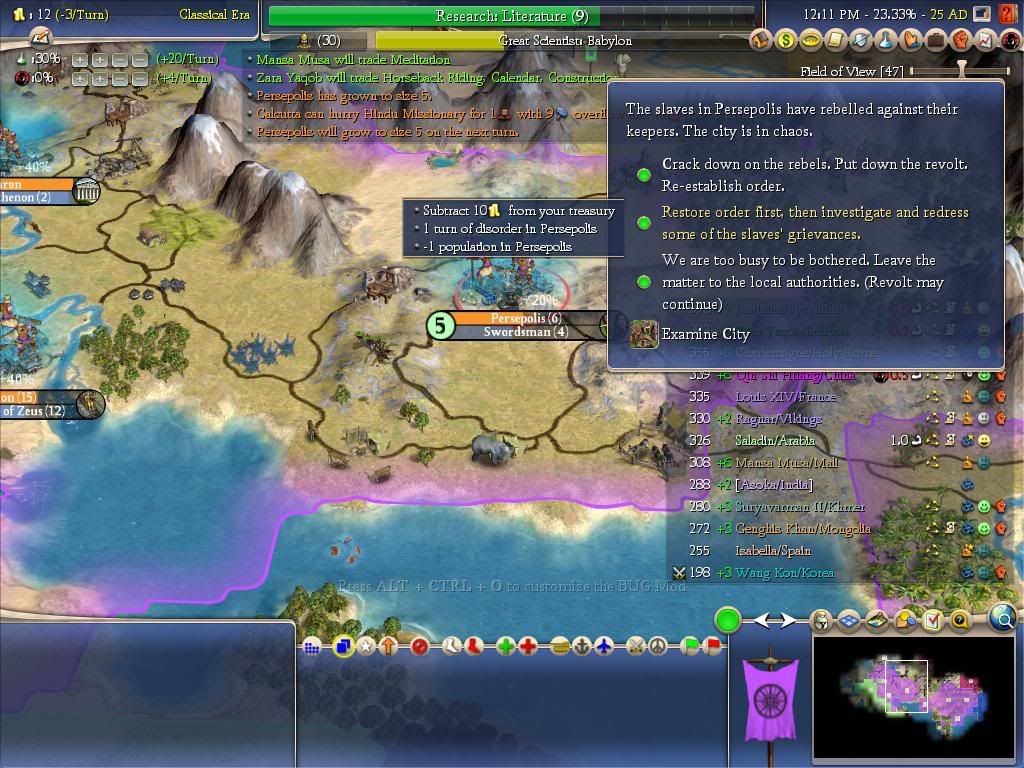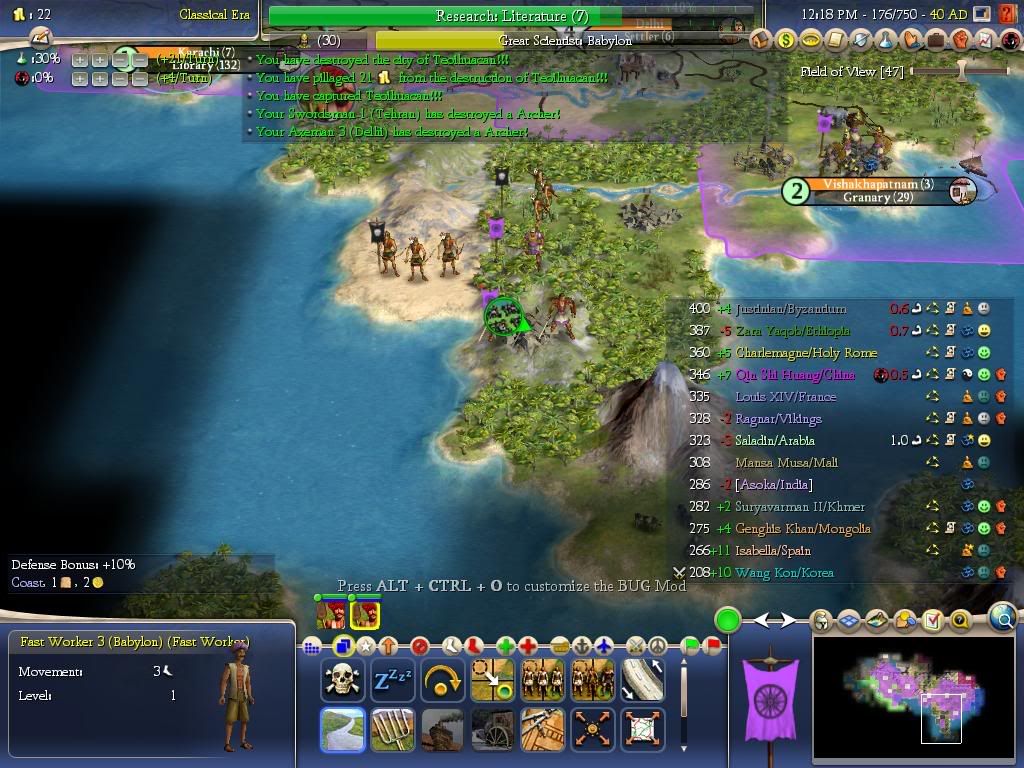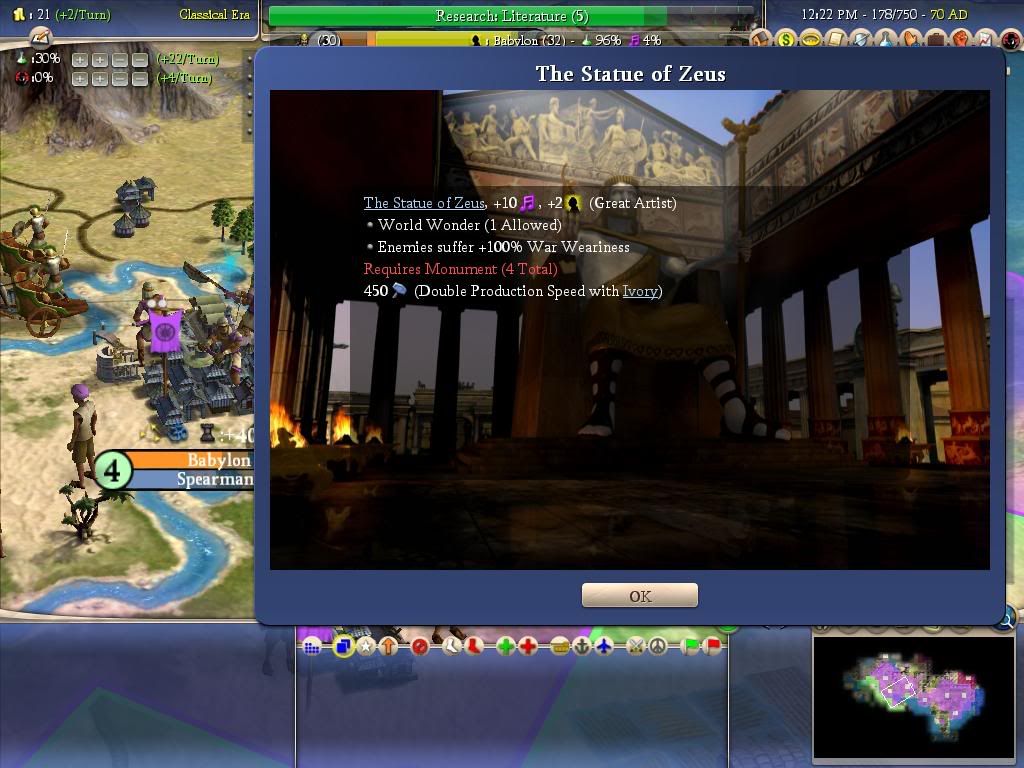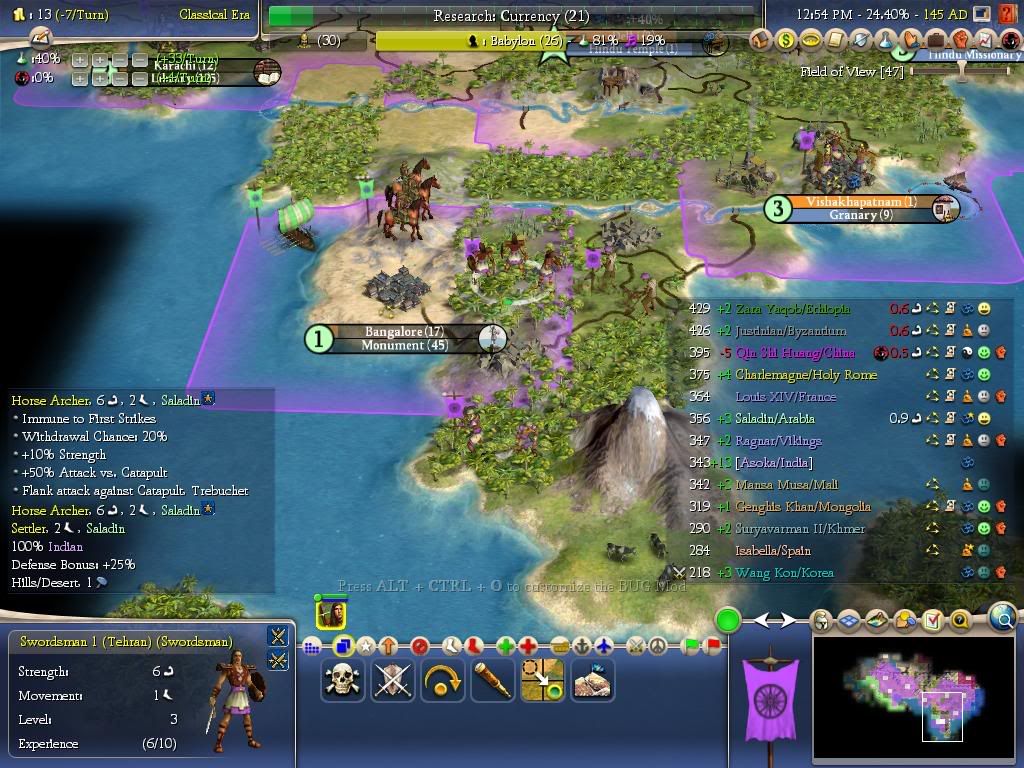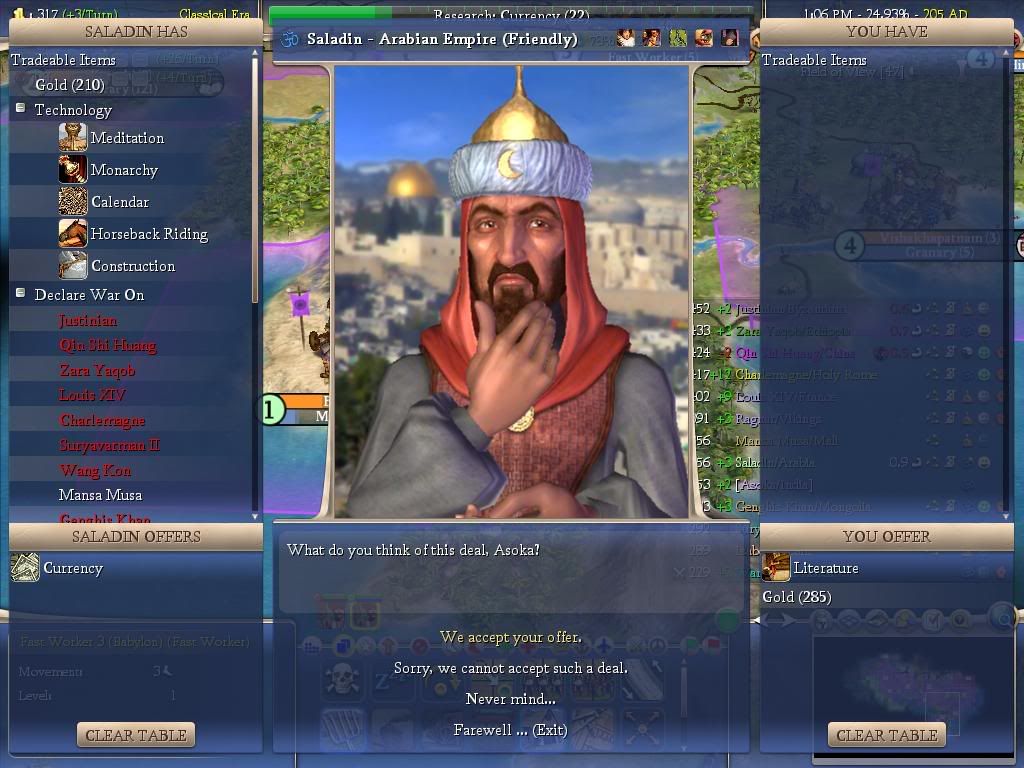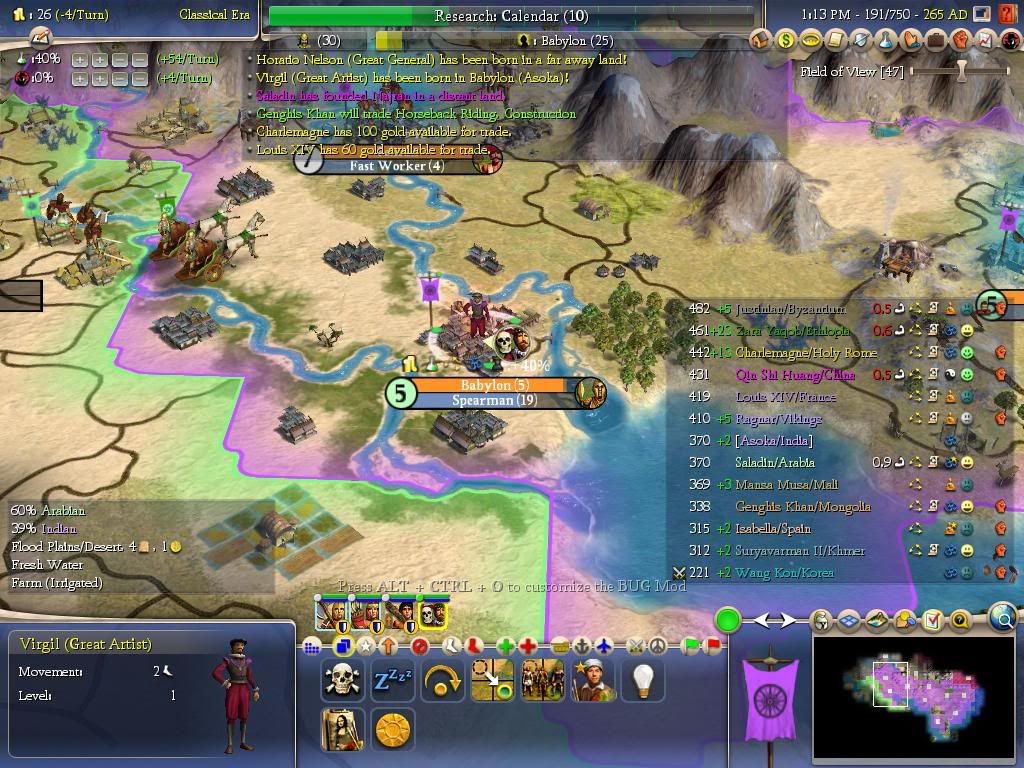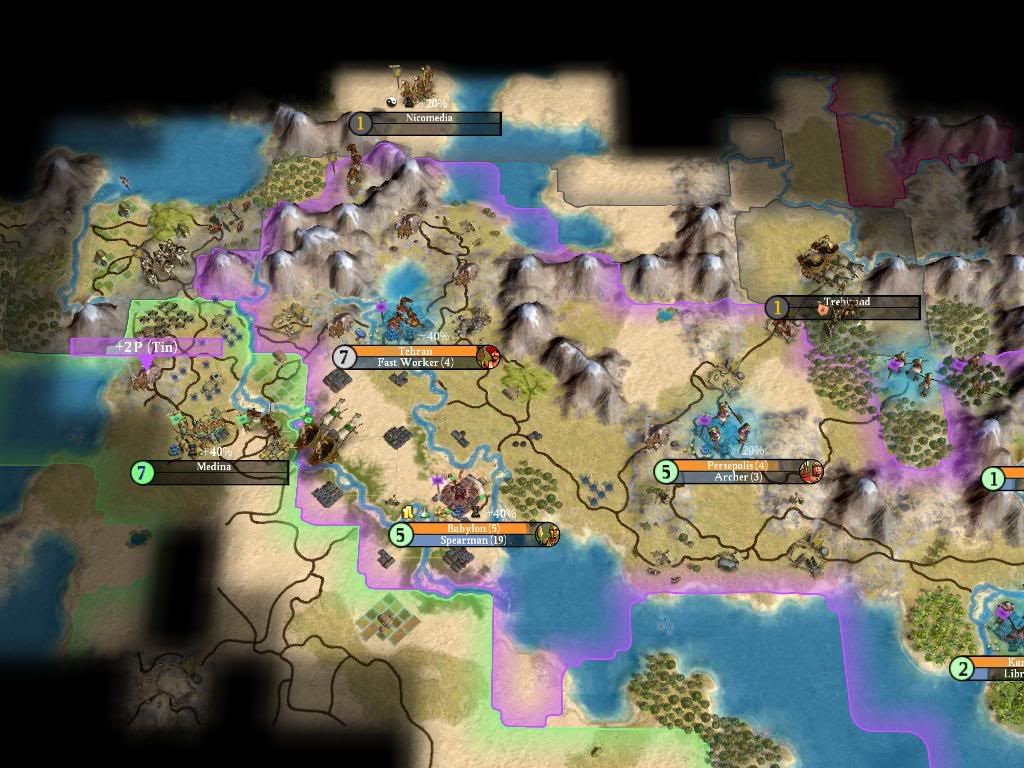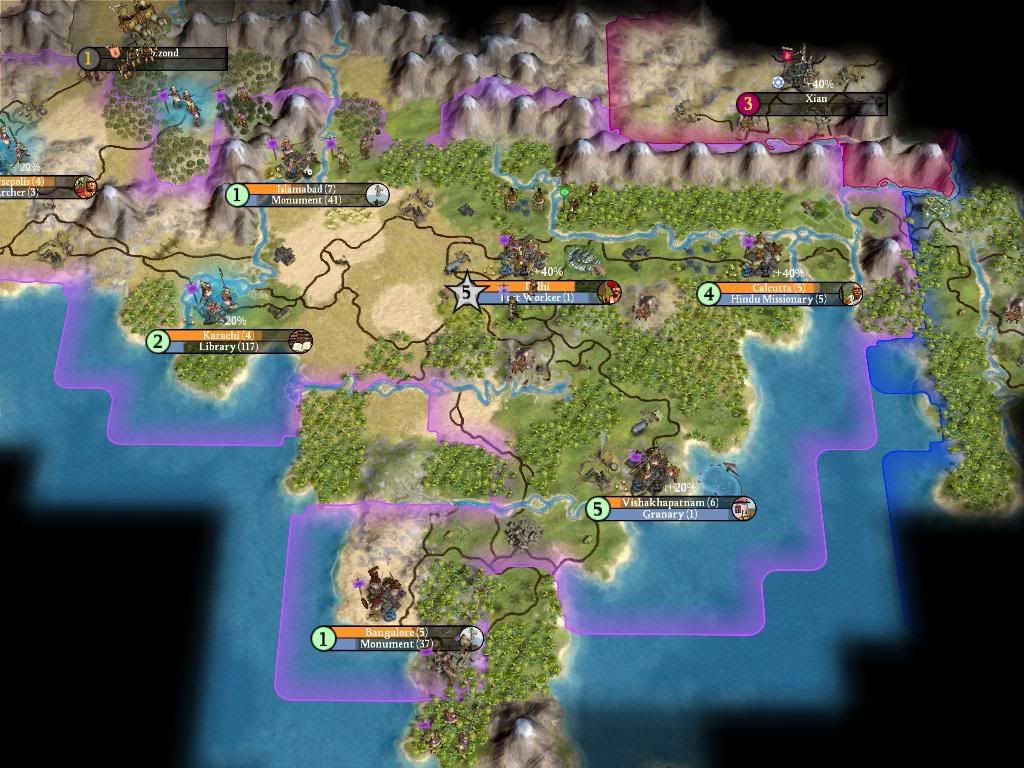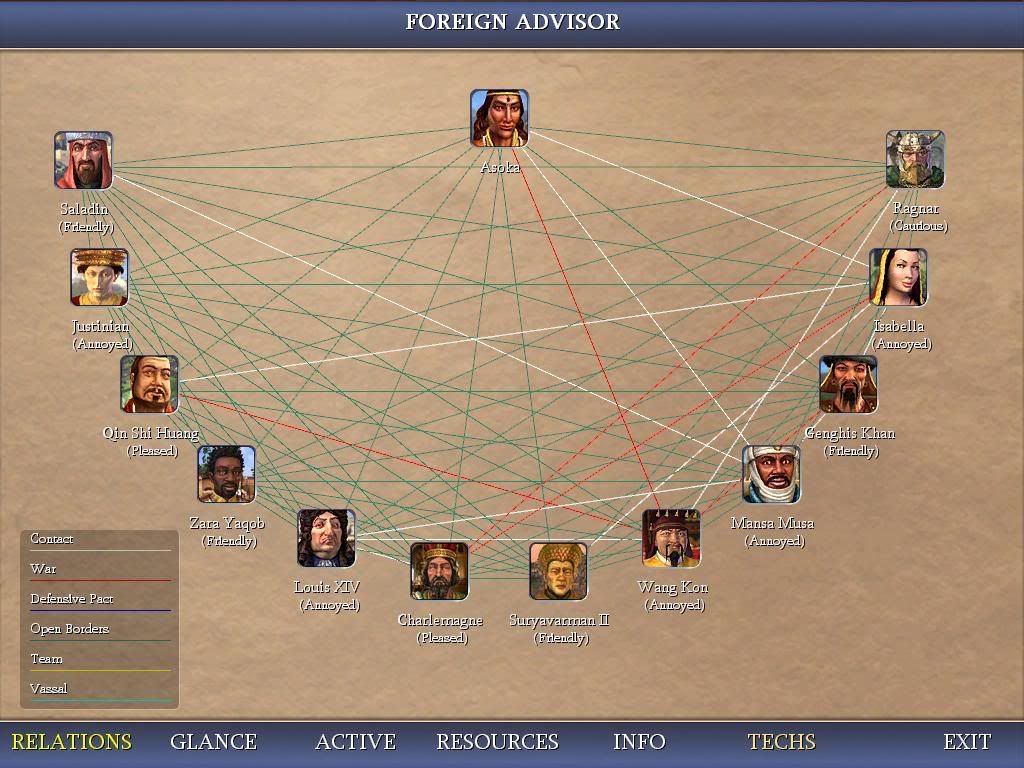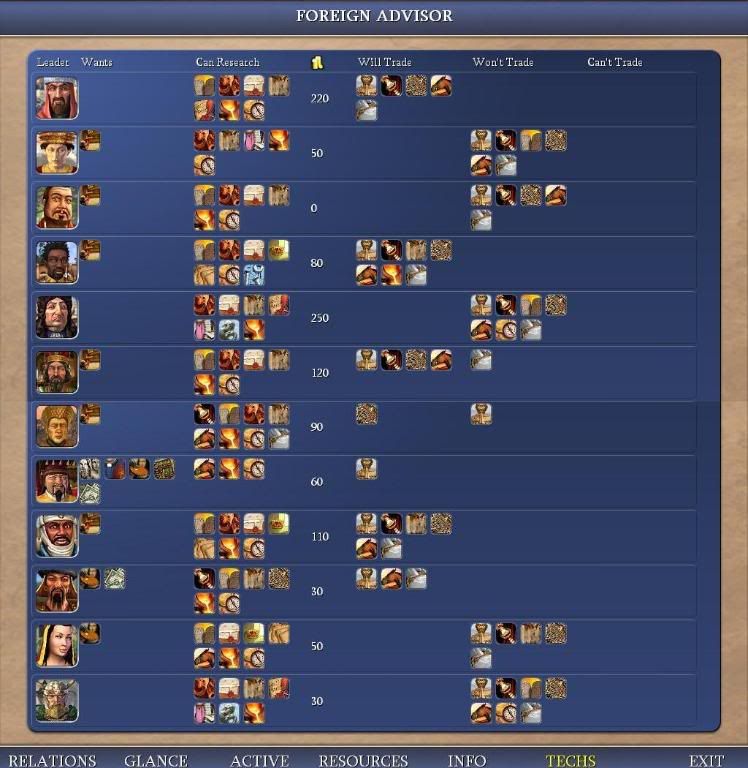Lord Asoka breathed a sigh of relief. The Nationless Ones had been beaten back. The economy was, if not thriving, then at least recovering. And the borders had been largely established.
A trade was made with the disconcertingly alien Khmer peoples to the east:
Suryavarman may have been strange, with his advanced Technology and bizarre architecture, but he seemed friendly enough. A green-robed Khmer tutor was sent to the Palace at Delhi, bearing holy books in the Hindu tradition. The Khmer were themselves not a religious people, but they recognized Asoka's faith and, in a gesture of good will, they offered to teach him the background of his Polytheistic faith along with the rudiments of their Alphabet. In exchange, one of India's finest ornamental Iroworkers was sent eastward to Malaysia to teach both practical metallurgy and the finer details of Aesthetics. Years later when Indian returned to Calcutta, he told tales of strange foods and inscrutable rituals. He had, however, been treated well.
In the western half of the empire, where the rich flaunted their wealth, engaging in constant one-upsmanship with their Arab neighbors, massive public works were started to bear constant witness to the supremacy of Indian culture:
Tehran's Parthenon was the more ambitious project, but they had a thriving Production base, eager to prove their superiority over Medina. Babylon (or Ur, as it was called by Advisor Cheese) was more a city of commerce and science, lacking the laborers to match Tehran. They were assigned the construction of a Statue of Zeus that would call down the wrath of the heavens upon any who would declare war on the Indian people. This was a comparatively simple task, with ready access to Ivory to fashion the sculpture, but it would take quite some time.
As the western nobility built monuments to their own grandiosity, the people of the eastern homeland were forced to fight for their very survival:
Attila, Chief Warlord of the Nationless Ones, gnashed his teeth in fury upon learning of the fate of Gaul. Vishakhapatnam, the decadent Indian village overlooking the ruins of his camp, would burn. He rounded up his finest horsemen, and moved out to exact his vengeance.
Reports of the beast-mounted terrors boiling forth from the southern jungles reached Delhi and threw the court into an uproar. Vishakhapatnam was a lost cause. Nothing could be done to save those poor, doomed Settlers. But the capital city itself was threatened. Press gangs roamed the streets of Delhi and Calcutta, clapping any able-bodied men they could find into crude armor. The recruits were taught the basics of holding the line against a charge, and were given spears that were honestly little more than sharpened sticks. They were then sent to the outskirts of Delhi, to await the attack. But more forces would be needed. Backbreaking taxes were levied on the people, and Asoka was forced to sell Aesthetics to Zara Yaqob, the world's premier moneylender, for pennies on the dollar so as to be able to upgrade the crude Warriors stationed in the Palace:
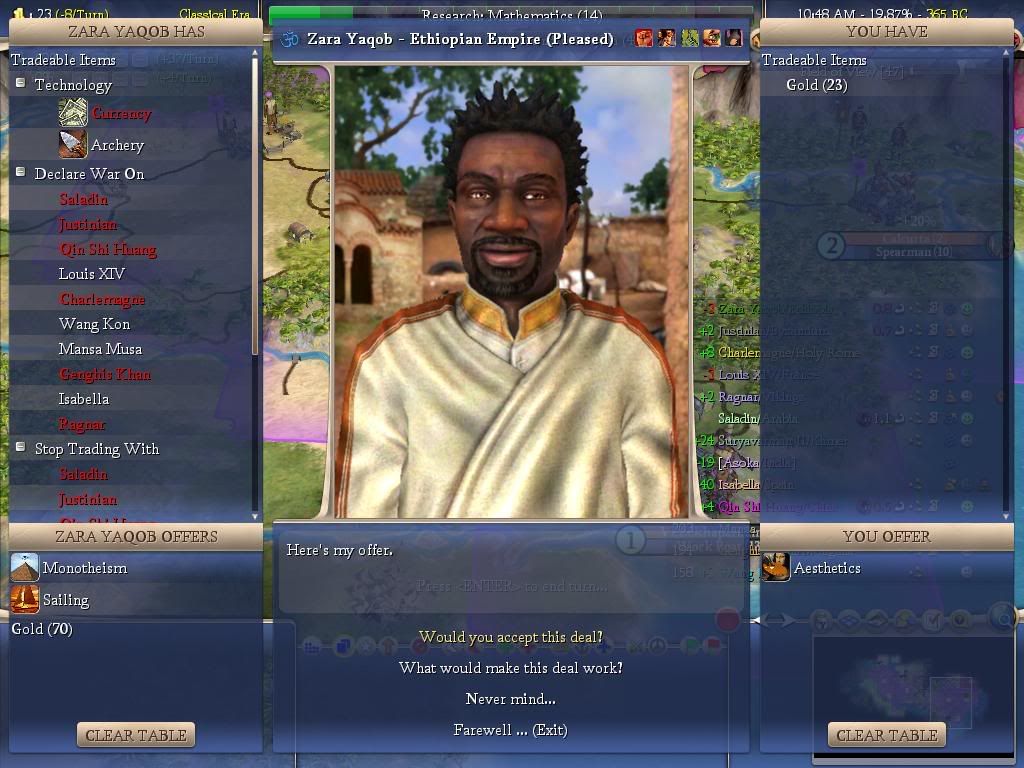
As even Advisor Gump had predicted, the single contingent of Axemen stationed in the City of Destiny were not enough to hold off the assault. As a pair of Horse Archer regiments stayed to loot the ruins and make off with women and children, the rest swooped northwest to stand within striking distance of Delhi.
Delhi stood as ready as it ever would. The Palace Guards were ready for a refit, and they stood backed up by the hastily recruited citizen-soldiers from the city:
Victory was not assured, but neither was defeat. Lord Asoka stood on a watchtower overlooking the forces arrayed against him. If all was lost, his hand stood ready on the "Load Game" button. He did not wish to resort to such extreme measures but, in defense of his people, no tactic was truly unthinkable.
Attila, seeing once-ripe Delhi now bristling with Spears, cursed Asoka's name, tossed the severed head of the Vishakhapatnam governor down in the dust, and rode off to the north. He had had his revenge:
Asoka and his generals watched them go, wordlessly. They were victorious. Delhi had been saved. But the city had been ravaged in preparations for the attack. The economy was, once again, in tatters. Vishakhapatnam was a smoldering ruin. Asoka silently descended the watchtower's staircase, gathered up the desiccated head, and brought it back to the Palace where it was given a full burial, with honors. "What shall we do?" asked one Spearman, who had been a simple baker's apprentice before the attack. "There is only one thing we can do," Asoka said, his voice heavy. "We rebuild."
Sensing the frailty of the Indian government, Qin Shi Huang sent a cadre of trained Swordsmen to coerce Asoka into assisting them in their war against Korea:
With troop morale low and desperate for allies, Asoka reluctantly agreed. Korea was a distant target. There was nothing to fear from the war. Though, when Wang Kon converted to Hinduism and China adopted their own Taoist faith, Asoka knew that he had chosen the wrong side in the war, but it was too late to make amends.
With Indian Science stagnant during and after the Huns' assault, Asoka was forced to beg for Technologies from his neighbors like a common street urchin:
Asoka was a humble leader, though, and he understood that the survival of his people depended on his debasement. He hid his shame as best he could, but he knew that the rumor mill was churning with tales of his impotence. He accepted this with as much grace as he could muster.
By 155 B.C., the City of Destiny stood rebuilt at last:
This was an time of much celebration, as even Asoka's harshest critics was forced to admit that he was determined to make India great once again. At the rededication ceremony, Lord Asoka promised that the Indian subcontinent would be tamed and rid of the Nationless Ones within 500 years.
Secretly, the Indian leader rejoiced in his strong cultural ties with the Arabs and the Khmer, who had converted to Hinduism (though they worshipped in their own, mysterious ways with their services closed to outsiders). In what the elite of Babylon and Tehran derisively called another show of flamboyance by the arrogant Saladin, an elaborate wedding in the Hindu tradition further cemented the Indian-Arab bond of brotherhood:
With close allies to the east and west, impenetrable mountains to the north, and the tempestuous oceans to the south, Asoka finally felt secure.
That sense of security was shattered in 20 B.C. as Arab colonists attempted to claim for themselves the fertile lands between Persepolis and Delhi:
Apparently, in 3.19 the AIs are a little more comfortable using boats to settle their own continent! Indian Settlers founded Karachi just in time, sending the disappointed Arabs sulking back west.
Even as today, the proud citizenry of Persepolis identified themselves with their city more than they did with the Indian empire. Calling themselves Persians, a band of radicals shut down the colonial government, threatening to declare independence:
Upon learning that these agitators were escaped slaves, Asoka countermanded his generals' orders to crush the revolt. Asoka hated Slavery, but considered it a necessary evil for the harsh times he found himself in. He appeared in person to negotiate with the rebel leader, agreeing to terms of limited self-government and less harsh working conditions in exchange for renewed oaths of allegiance. His entourage left the city to cheers and chants of his name. Order had been restored.
In 40 A.D., the Barbarian's last stronghold in India was destroyed:
While the Persians of Persepolis were granted clemency, the bandits of Teoihuacan were shown only the mercy of quick summary executions. After the massacre at Vishakhapatnam, the Indian government had ceased to even consider the Nationless Ones human.
Shortly thereafter, as if to prove to the world that India was ready to be great once again, Tehran and Babylon completed their Wonders:
They were more magnificent than even their long-dead architects had imagined. The Parthenon turned the vain nobles of the western empire from shows of facile splendor to great works of thought that are still studied to this day. And the Statue of Zeus towered over the Arab border, daring any to declare war on the blessed Indian people.
And the race for the final land grab was on. As with Karachi before it, Bangalore was founded just before being denied by Arab sailors:
Its location will, as outlined by Advisor Von Baron, allow for a potential Moai city claiming the southern Cows from the island of Sri Lanka. It also exchanges a Desert and Peak from the original dotmap for a number of productive tiles that would otherwise go unworked. The Arabs, as with the routed colonists before them, sullenly plodded back to Medina.
With horizontal expansion nearly complete, it was time to focus on fixing the economy. The adoption of an imperial Currency was, of course, the first step:
Even in those early ages, the Great Library had been built in unknown lands, but the Technology would nevertheless be useful in trade. Nobody we knew had knowledge of Literature before we did.
In 265 A.D., a minor tragedy occurred in Babylon. Young Virgil, growing up in the city's massive Library studying Mathematics, was to be the foremost Great Scientist of his day. During a break from his studies, though, he sat at the feet of the Statue of Zeus and was said to be inspired:
He left the sciences behind, claiming a desire only to write poetry and glorify the art in all things. Perhaps he can stil be of some use. Perhaps he can settle in Babylon or some other city. Perhaps he can teach us the secrets of Drama. Perhaps he can start a Golden Age, in which great things can be built and the secrets of the universe can be laid bare.
So I decided to call a halt there. It was an extremely rough round, but I feel that I've weathered it about as well as I could be expected to. Here's the empire:
At this point, I believe we should decide on our Legendary cities. Delhi, Babylon, and...? Vishakhapatnam and Calcutta both have potential, as do even Persepolis and Tehran (though those would concentrate more on Wonder-Whoring their way to greatness). Maybe we should send our Artist to settle in whatever we decide for our third city.
I think we're doing well playing nice with the neighbors:
So long as Saladin and Sury are happy, I think they'll keep us safe from everything except a potential Byzantine invasion from the north of Persepolis.
Finally, a peek at the Tech screen:
Yeah, we're behind. But I think that, as our cities start to become profitable, we'll catch up. For now, are there any obvious trades anyone is seeing?
Here's the save:
